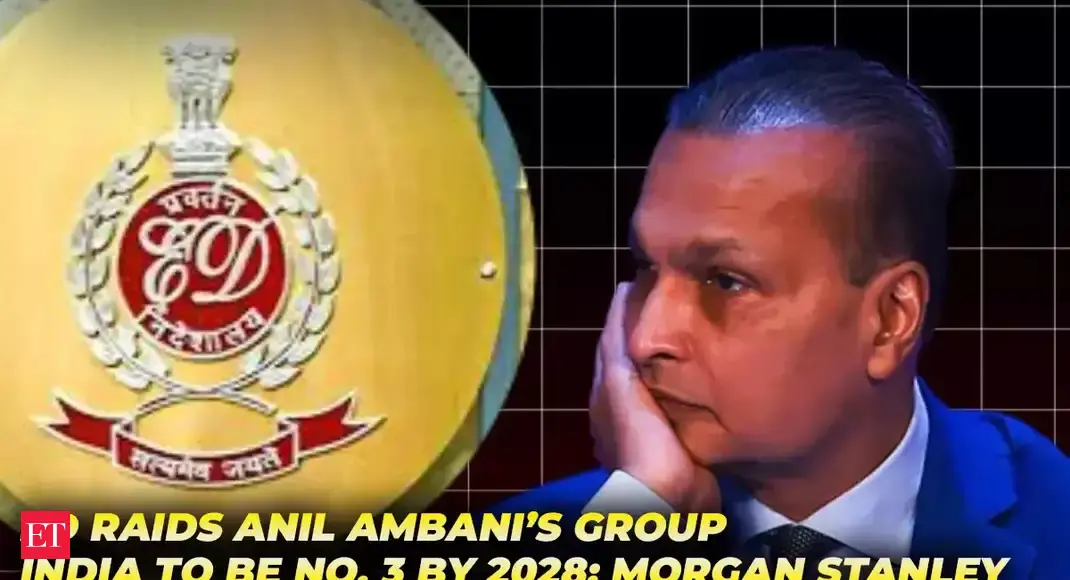

The Enforcement Directorate (ED) conducted raids on multiple locations across Mumbai on Thursday, targeting companies associated with Anil Ambani's Reliance Group. These actions are part of a money laundering investigation related to an alleged bank loan fraud of ₹3,000 crore. Simultaneously, a recent report by Morgan Stanley projects India to become the world's third-largest economy by 2028, with its GDP more than doubling to $10.6 trillion by 2035.
ED Raids on Anil Ambani's Companies
The ED's raids involved over 35 locations in Mumbai, encompassing around 50 companies and 25 individuals. The investigation focuses on the alleged diversion of funds from loans granted by Yes Bank to Anil Ambani's group companies between 2017 and 2019. ED sources suggest that Yes Bank promoters received funds in their ventures just before these loan disbursements, raising suspicions of a quid pro quo. The agency is also scrutinizing alleged breaches in Yes Bank's loan approvals, including backdated credit approval memorandums and investments proposed without proper credit analysis.
The ED's investigation is based on two FIRs filed by the Central Bureau of Investigation (CBI) in September 2022. The CBI cases pertain to loans extended by Yes Bank to Reliance Home Finance Ltd (RHFL) and Reliance Commercial Finance Ltd (RCFL). The ED is also probing a significant increase in corporate loans disbursed by RHFL, which rose from ₹3,742.60 crore in FY 2017–18 to ₹8,670.80 crore in FY 2018–19.
In response to the raids, Reliance Power and Reliance Infrastructure issued clarifications stating that the ED's actions would not impact their business operations, financial performance, shareholders, employees, or other stakeholders. They also asserted that they have no business or financial links to Reliance Communications and Reliance Home Finance, which are reportedly at the center of the ED's investigation.
These raids represent another setback for Anil Ambani's business house, which has faced numerous crises in recent years. Companies like Reliance Communications, Reliance Capital, Reliance Power and Reliance Infrastructure have struggled with mounting liabilities and regulatory challenges. In August 2024, the Securities and Exchange Board of India (SEBI) banned Anil Ambani and 24 other entities from participating in the securities market for five years.
India's Economic Ascent
Despite these challenges for some businesses, India's overall economic outlook remains positive. Morgan Stanley's recent report projects India to become the world's third-largest economy by 2028 and reach a GDP of $10.6 trillion by 2035. The report suggests that three to five Indian states, including Maharashtra, Tamil Nadu, Gujarat, Uttar Pradesh, and Karnataka, could each have economies approaching $1 trillion by 2030–2035, potentially placing them among the top 20 global economies. Currently, Maharashtra, Gujarat, and Telangana are the top-performing states. Chhattisgarh, Uttar Pradesh, and Madhya Pradesh have shown the most significant improvements in economic rankings over the past five years.
Morgan Stanley expects India to contribute approximately 20% of global growth over the next decade, becoming a crucial driver of earnings for multinational corporations. The report emphasizes the vital role of India's states and union territories in achieving this growth. These entities compete for investments by creating suitable policies and easing business conditions. Infrastructure spending has seen a major boost over the past decade, with the central government's capital expenditure doubling to 3.2% of GDP in FY25 from 1.6% in FY15. This has resulted in significant expansion of highway networks, airports, and metro rail systems.